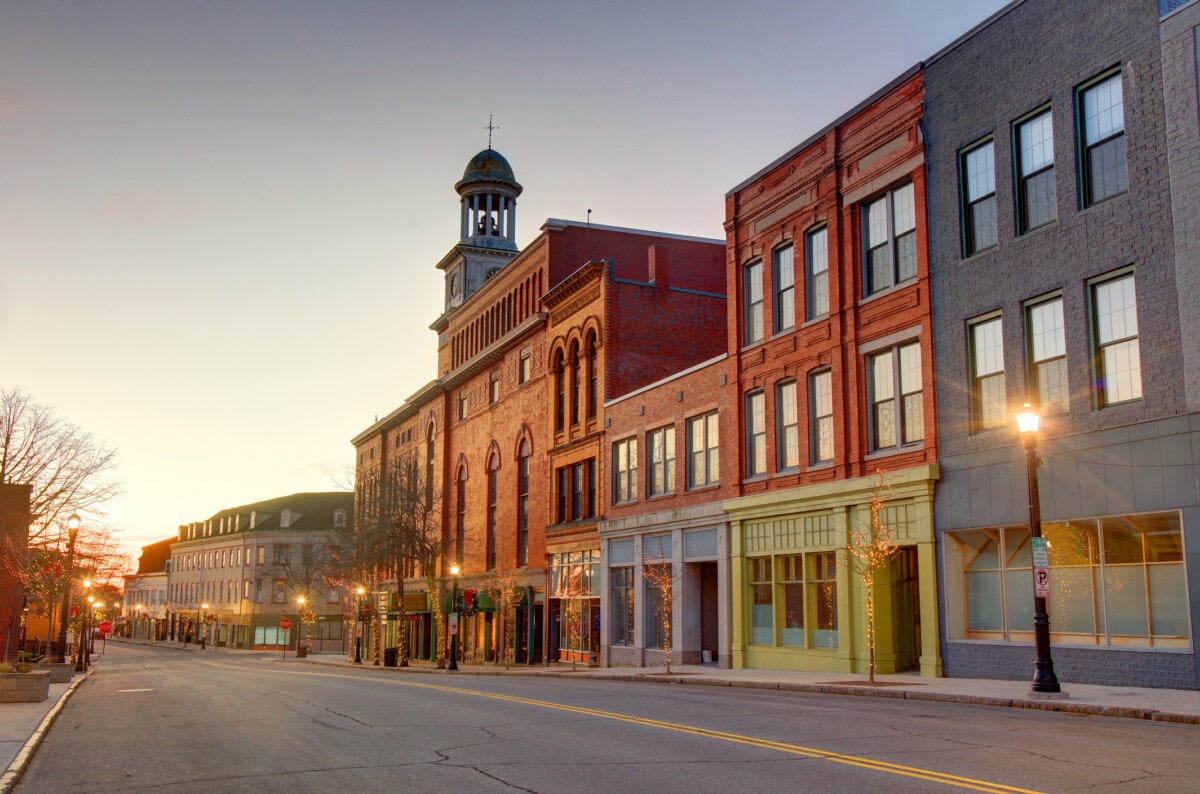Portland, Maine is quickly becoming home for many Mainers and out-of-staters alike. “The Forest City” is home to 68,300 people and is recognized by its picturesque waterfront, a thriving culinary scene showcasing fresh seafood, and the vibrant arts community exemplified by the Portland Museum of Art. If you’re looking to buy a home in Portland, expect to see the median home sale price coming in at $559,000. And if you’re looking to rent an apartment, the average rent in Portland is $2,358.
Don’t worry if those prices don’t fit in your budget – we’ve got options to help you find a home or apartment that does. We’ve rounded up a list of the 10 best affordable Portland, Maine suburbs to consider living in – and they’re all under a 27 mile drive from the city. That way you can live close to Portland and all its cool activities without the price tag of owning a home there.

#1: Old Orchard Beach
Median home price: $346,500
Average sale price per square foot: $352
Average rent for an apartment: $2,394
Distance from Portland: 20 miles
Old Orchard Beach, ME homes for sale
Old Orchard Beach, ME apartments for rent
With a median home sale price of $346,500, Old Orchard Beach comes in at number one on our list of most affordable Portland, Maine suburbs. About a 20 mile drive away from downtown Portland, Old Orchard Beach is home to roughly 8,900 people. Living in Old Orchard Beach, you can have a beach day at Old Orchard Beach and see the iconic Old Orchard Beach Pier, known for its entertainment, shops, and scenic views of the Atlantic Ocean, take a historic walking tour, which highlights Old Orchard Beach’s notable landmarks, or go camping at one of the campgrounds in town.
#2: Standish
Median home price: $347,500
Average sale price per square foot: $234
Distance from Portland: 21 miles
Standish, ME homes for sale
Standish, ME apartments for rent
Coming in as the second most affordable suburb in Portland is Standish. About a 21 mile drive away from downtown Portland, you can explore the Old Port District and the Eastern Promenade in no time. Some popular things to check out in Standish include spending the day at Sebago Lake, from visiting the Sebago Lake Scenic Overlook, checking out Harmon’s Beach, to hiking along the trails, and exploring the nearby Steep Falls Wildlife Management Area.
#3: Westbrook
Median home price: $373,000
Average sale price per square foot: $265
Average rent for an apartment: $2,481
Distance from Portland: 7 miles
Westbrook, ME homes for sale
Westbrook, ME apartments for rent
With a median home sale price of $373,000, Westbrook takes the third spot on our list. There are plenty of picturesque and outdoorsy activities to take part in when living in Westbrook. Make sure to check out the shops, cafes, and riverfront restaurants in downtown Westbrook, take in the views at Riverbank Park, and explore the trails at Mill Brook Preserve if you move to the third most affordable suburb.

#4: North Windham
Median home price: $393,000
Average sale price per square foot: $242
Distance from Portland: 16 miles
North Windham, ME homes for sale
North Windham, ME apartments for rent
Only slightly more expensive than Westbrook is none other than North Windham. There are several top attractions you may want to check out in Portland suburb. So make sure to explore parks like Donnabeth Lippman Park.
#5: Gorham
Median home price: $447,500
Average sale price per square foot: $313
Distance from Portland: 11 miles
Gorham, ME homes for sale
Gorham, ME apartments for rent
About an 11 mile drive into the city, consider adding Gorham to your list of Portland, Maine suburbs to consider moving to. With 18,300 people living in this affordable town, Gorham is a great option to consider when looking to stay close to Portland without paying the premium for a home in the city. In Gorham, you can check out the University of Southern Maine campus and downtown area or explore the picturesque Shaw Park.
#6: Saco
Median home price: $475,000
Average sale price per square foot: $285
Average rent for an apartment: $2,433
Distance from Portland: 17 miles
Saco, ME homes for sale
Saco, ME apartments for rent
A recognizable Portland suburb is Saco, where you’ll find the home prices are about $85K less than in Portland. With just about 20,400 people living in Saco, it’s a great suburb to consider moving to. Whether you explore one of the many nature areas like Ferry Beach State Park or Saco Heath Preserve, have a beach day at Camp Ellis Beach or Ferry Beach, or grab a coffee at a local café, there’s many cool things to do and see in this suburb.

#7: Biddeford
Median home price: $500,000
Average sale price per square foot: $285
Average rent for an apartment: $1,882
Distance from Portland: 18 miles
Biddeford, ME homes for sale
Biddeford, ME apartments for rent
Claiming the seventh spot on our list of affordable Portland suburbs is Biddeford, which is roughly an 18 mile drive into downtown. With a population of nearly 22,500, living in Biddeford is a great alternative to the hustle and bustle of Portland. Don’t miss out on hiking Timber Point Trail out to the picturesque Timber Point, checking out Fortune Rocks Beach, and exploring the quaint downtown area where there are lots of cafes and shops.
#8: Kennebunk
Median home price: $512,750
Average sale price per square foot: $311
Distance from Portland: 27 miles
Kennebunk, ME homes for sale
Kennebunk, ME apartments for rent
If you’ve lived in Portland for a while, chances are you know of Kennebunk. About 11,500 people reside in Kennebunk, so you’ll have a fraction of Portland’s population while remaining close to the city and its attractions. Be sure to check out the Kennebunk Plains Preserve, visit the downtown area with quaint shops, museums like the Brick Store Museum, and local restaurants, and spend the afternoon at the beach once you move to Kennebunk.
#9: Scarborough
Median home price: $530,000
Average sale price per square foot: $323
Distance from Portland: 8 miles
Scarborough, ME homes for sale
Scarborough, ME apartments for rent
Without traffic, you’ll be in downtown Portland in about 10 minutes, making Scarborough a great place to live in. About 5,800 people live in this suburb, but there’s always something new to explore in Scarborough. Popular things to do in Scarborough include exploring Scarborough Beach State Park, checking out the Scarborough Marsh Audubon Center, and hiking one of the many trails throughout the area.
#10: South Portland
Median home price: $540,000
Average sale price per square foot: $360
Average rent for an apartment: $1,935
Distance from Portland: 3 miles
South Portland, ME homes for sale
South Portland, ME apartments for rent
Claiming the 10th spot on our list of affordable suburbs of Portland, Maine is South Portland. Without traffic, you’ll find yourself in Portland in under 10 minutes. This suburb has a population of 26,500 and you can check out Willard Beach and the nearby Fort Preble, or take in the views from Bug Light Park. There’s plenty to do on an afternoon or weekend while living in this charming town.
Methodology: Affordability is based on whether a suburb’s median home sale price or average sale price per square foot is less than Portland and under a 27-mile drive from downtown Portland. Median home sale price data and average rent price from the Redfin Data Center during December 2023. Population data sourced from the United States Census Bureau.
Portland, OR, known for “keeping it weird,” is a vibrant city with eclectic neighborhoods and a thriving arts scene. With picturesque riverfront views, countless green parks, and a renowned farm-to-table food scene and craft beer culture, it’s no wonder why residents flock to this West Coast gem.
From the trendy and vibrant Alberta Arts District to the charming Beaumont-Wilshire neighborhood, Portland offers a diverse range of neighborhoods to suit every lifestyle. The average rent in Portland is $2,000, while the median sale price is $500,000.
So whether you’re a nature enthusiast seeking tranquility or are looking for a lively atmosphere, Portland has a neighborhood that will feel like home. At Redfin, we’ve put together a list of 25 popular Portland neighborhoods to explore. That way, you’ll find the right neighborhood to buy a home or rent an apartment in Portland this year.

1. Alberta Arts District
The Alberta Arts District is known for its vibrant arts scene, unique shops, and diverse dining options. The neighborhood is home to numerous art galleries, theaters, and craft breweries. It also has a monthly street fair, Last Thursday on Alberta Street, where locals and visitors can enjoy live music, art demonstrations, and food vendors. The district has several parks, including Alberta Park, which offers sports fields, a playground, and picnic areas.
The Alberta Arts District features a mix of housing types, including Craftsman-style homes, bungalows, and apartment buildings. The architectural styles in the neighborhood range from historic Victorian houses to modern, eco-friendly designs.
Median Sale Price: $805,000
Average Rent 1-Bedroom Apartment: $1,400 | Average Rent 2-Bedroom Apartment: $1,900
Homes for Sale in Alberta Arts District | Apartments for Rent in Alberta Arts District
2. Beaumont-Wilshire
Beaumont-Wilshire is a charming residential area known for its tree-lined streets and variety of shops, restaurants, and cafes located along NE Fremont Street. The neighborhood is also home to the beautiful Wilshire Park, which offers a playground, sports fields, and picnic areas. Beaumont-Wilshire is rich in history, with notable landmarks such as the stunning Frank Barnes House. Beaumont-Wilshire features a mix of housing types, including Craftsman-style homes, bungalows, and Tudor-style houses.
Median Sale Price: $780,000
Homes for Sale in Beaumont-Wilshire | Apartments for Rent in Beaumont-Wilshire
3. Belmont
Belmont offers a vibrant and trendy atmosphere, known for its restaurants, vibrant nightlife, and unique shops. The Belmont neighborhood is also home to several beautiful parks, including Laurelhurst Park. In terms of history, the neighborhood features several historic homes and buildings, adding to its charm. Belmont offers a mix of housing types, including charming Craftsman-style homes, modern apartments, and townhouses.
Median Sale Price: $659,000
Average Rent 1-Bedroom Apartment: $1,450 | Average Rent 2-Bedroom Apartment: $1,645
Homes for Sale in Belmont | Apartments for Rent in Belmont
4. Boise
Boise is in the North Portland area. Major attractions in the area include Mississippi Avenue and Williams Avenue, which are known for their trendy shops, restaurants, and bars. The neighborhood also features several beautiful parks, such as Overlook Park and Denorval Unthank City Park. Boise is known for its historic places, including the historic Mississippi Avenue and the Overlook House.
Boise offers a variety of housing types, including single-family homes, townhouses, and apartments. The architectural styles you can find in the neighborhood range from classic Victorian homes to modern apartment complexes.
Median Sale Price: $599,000
Homes for Sale in Boise | Apartments for Rent in Boise
5. Brooklyn
Located in southeast Portland, Brooklyn is known for its proximity to downtown Portland and the Willamette River. Major attractions in Brooklyn include Brooklyn Park, where residents can enjoy beautiful views of the river, and the Poulsen House, a 1920s Queen Anne-style mansion overlooking the river. In Brooklyn, you will find a mix of housing types, including charming bungalows and historic Victorian homes.
Median Sale Price: $506,500
Homes for Sale in Brooklyn | Apartments for Rent in Brooklyn

6. Buckman
Buckman is known for its vibrant arts scene, hip restaurants, and eclectic shops. It’s situated on the east side of the Willamette River, just across from downtown. Some major attractions in Buckman include the Revolution Hall, which hosts live music and events, and the Morrison Bridge, which offers stunning views of the city skyline. The neighborhood is also home to several parks, including Colonel Summers Park and Eastbank Esplanade.
Buckman offers a mix of housing types, including single-family homes, townhouses, and apartments. The architectural styles in the neighborhood range from Victorian and Craftsman homes to contemporary designs. Residents can enjoy the charm of historic architecture or opt for modern, newer constructions.
Median Sale Price: $687,500
Average Rent 1-Bedroom Apartment: $1,472 | Average Rent 2-Bedroom Apartment: $1,895
Homes for Sale in Buckman | Apartments for Rent in Buckman
7. Cathedral Park
Cathedral Park is known for its beautiful location along the Willamette River, offering stunning views of the St. Johns Bridge. The neighborhood is home to Cathedral Park, a peaceful green space perfect for picnics and recreation. You can also find the St. Johns Bridge, a historic landmark and a popular spot for photography enthusiasts. Cathedral Park features a mix of housing types, including single-family homes, townhouses, and apartments. The architectural styles in the neighborhood range from traditional craftsman homes to modern condos.
Median Sale Price: $364,400
Average Rent 1-Bedroom Apartment: $1,320 | Average Rent 2-Bedroom Apartment: $1,810
Homes for Sale in Cathedral Park | Apartments for Rent in Cathedral Park
8. Concordia
Located north of the Beaumont-Wilshire area, Concordia is a vibrant neighborhood known for its tree-lined streets and charming atmosphere. It’s home to many parks, including Fernhill Park and Alberta Park, which offer a variety of recreational activities such as hiking, biking, and picnicking. The neighborhood also boasts several historic places, such as Alberta Rose Theatre and the McMenamins Kennedy School, a former elementary school turned into a fancy hotel, restaurant, and movie theater.
Concordia predominantly features single-family homes and bungalows, with architectural styles ranging from Craftsman to Colonial. The neighborhood offers a charming mix of older homes and newer constructions, making it a great option for those seeking a blend of character and modern amenities.
Median Sale Price: $640,000
Homes for Sale in Concordia | Apartments for Rent Concordia
9. Downtown Portland
Downtown Portland is located in the heart of the city and is known for its vibrant and bustling atmosphere. It’s home to many major attractions, such as Pioneer Courthouse Square and the Portland Art Museum. The neighborhood also offers numerous parks and green spaces, including Tom McCall Waterfront Park and South Park Blocks. For history buffs, there are several notable historic places to explore, such as the Keller Auditorium, the Arlene Schnitzer Concert Hall, and the Portland Farmers Market.
Downtown Portland offers a variety of housing types, including modern apartments, lofts, and condos. The architectural styles in the neighborhood range from historic brick buildings to sleek contemporary designs.
Median Sale Price: $355,500
Average Rent 1-Bedroom Apartment: $1,375 | Average Rent 2-Bedroom Apartment: $1,635
Homes for Sale in Downtown Portland | Apartments for Rent in Downtown Portland
10. Eastmoreland
Eastmoreland is a charming neighborhood known for its beautiful tree-lined streets and historic homes, located in southeast Portland. The area is near Reed College, the Crystal Springs Rhododendron Garden, and the Eastmoreland Golf Course, all adding to the quaint and warm feel of the neighborhood. Eastmoreland’s homes have a variety of architectural styles, including Tudor, Colonial, and Craftsman homes.
Median Sale Price: $922,500
Homes for Sale in Eastmoreland | Apartments for Rent in Eastmoreland

11. Hawthorne
Hawthorne is known for its vibrant and eclectic atmosphere, with numerous shops, restaurants, and bars lining the streets. The neighborhood is also home to several popular attractions, including the historic Hawthorne Theatre, McMenamins Bagdad Theater & Pub, and Powell’s Books. Hawthorne Boulevard, the main street in the area, is dotted with unique boutiques and vintage shops. For outdoor enthusiasts, Mt. Tabor Park is just a short distance away.
Hawthorne offers a mix of housing types, including single-family homes, townhouses, and apartments. Architectural styles in the neighborhood range from Craftsman and Victorian to mid-century modern.
Median Sale Price: $717,000
Average Rent 1-Bedroom Apartment: $1,495 | Average Rent 2-Bedroom Apartment: $1,995
Homes for Sale in Hawthorne | Apartments for Rent in Hawthorne
12. Hillsdale
Hillsdale is located in the southwest part of Portland and known for its close proximity to downtown and the beautiful views of the surrounding hills. Major attractions in Hillsdale include the Hillsdale Shopping Center and the Hillsdale Farmers Market. The housing types in Hillsdale vary, with a mix of single-family homes, townhouses, and apartments. Architectural styles in the neighborhood range from mid-century modern to traditional craftsman.
Median Sale Price: $725,000
Average Rent 1-Bedroom Apartment: $1,050 | Average Rent 2-Bedroom Apartment: $1,595
Homes for Sale in Hillsdale | Apartments for Rent in Hillsdale
13. Kenton
Kenton is known for its close proximity to the University of Portland, which attracts many students and faculty. Major attractions in Kenton include Kenton Park, which offers a playground and basketball courts, the popular Paul Bunyan statue, and Portland International Raceway. The neighborhood also has several historic places, including the Kenton Firehouse and Historic Vanport.
Kenton has a mix of housing types, with options ranging from single-family homes to apartments and townhouses. The architectural styles in Kenton vary, with a mix of Victorian, Craftsman, and mid-century modern homes.
Median Sale Price: $489,950
Homes for Sale in Kenton | Apartments for Rent in Kenton
14. Laurelhurst
Laurelhurst has beautiful historic homes and tree-lined streets. Major attractions include Laurelhurst Park, which is a popular spot for picnicking and recreation, and the Laurelhurst Theater, a historic cinema that showcases independent films. Some of the neighborhood’s historic places include the Laurelhurst Clubhouse, a Tudor-style community center, and Coe Circle. Laurelhurst features a variety of housing types, including Craftsman, Colonial, and Tudor-style homes. The architectural styles in the neighborhood reflect its rich history and offer a unique charm to residents.
Median Sale Price: $860,000
Homes for Sale in Laurelhurst | Apartments for Rent in Laurelhurst
15. Montavilla
Montavilla is located in the eastern part of Portland. This neighborhood offers a variety of attractions, including the historic Academy Theater, which showcases classic films, and the Montavilla Farmers Market, where residents can find fresh local produce. Montavilla is also home to Berrydale Park, a popular green space for outdoor activities. The housing in Montavilla consists mainly of single-family homes that exhibit a range of architectural styles, including Craftsman and Victorian.
Median Sale Price: $462,000
Average Rent 1-Bedroom Apartment: $1,345 | Average Rent 2-Bedroom Apartment: $1,705
Homes for Sale in Montavilla | Apartments for Rent in Montavilla
16. Mount Tabor
Mount Tabor is known for its beautiful scenic views and community feel. The neighborhood is home to Mount Tabor Park, which offers recreational activities, trails, and a peaceful atmosphere. Additionally, Mount Tabor has historic places such as the Zymoglyphic Museum. Mount Tabor features a mix of housing types, including Craftsman-style homes, bungalows, and modern townhouses that blend seamlessly with the natural landscape.
Median Sale Price: $650,000
Homes for Sale in Mount Tabor | Apartments for Rent in Mount Tabor
17. Multnomah Village
Multnomah Village is known for its charming small-town atmosphere, offering a variety of unique shops, galleries, and restaurants. The neighborhood is also home to Gabriel Park, which features walking trails, sports fields, and picnic areas. Multnomah Village also has historic places like the Multnomah Arts Center, where residents can enjoy art exhibitions and classes.
The housing types in Multnomah Village include single-family homes, townhomes, and apartments. The architectural styles in the neighborhood vary from classic ranch-style homes to modern designs.
Median Sale Price: $625,000
Average Rent 1-Bedroom Apartment: $1,425 | Average Rent 2-Bedroom Apartment: $1,375
Homes for Sale in Multnomah Village | Apartments for Rent in Multnomah Village
18. North Portland
Located in the northern part of the city, North Portland is a large area comprised of smaller neighborhoods like St. Johns, Cathedral Park, and Kenton. As a result, the neighborhood offers a diverse range of attractions, parks, and historical places. North Portland is in close proximity to the beautiful Columbia River, which provides ample opportunities for outdoor activities such as hiking and boating. Major attractions include the iconic St. Johns Bridge and the historic Mississippi Avenue, known for its vibrant arts and food scene.
North Portland features a mix of housing types and architectural styles. You’ll find everything from charming bungalows and Craftsman-style homes to modern condos. The neighborhood also offers a variety of affordable apartments and rental properties.
Median Sale Price: $477,000
Average Rent 1-Bedroom Apartment: $1,549 Average Rent 2-Bedroom Apartment: $2,099
Homes for Sale in North Portland | Apartments for Rent in North Portland
19. Northwest District (Nob Hill)
The Northwest District, also known as Nob Hill, is located in the northwest part of the city and has a vibrant atmosphere and unique character. The neighborhood is home to several popular attractions, including The Freakybuttrue Peculiarium and Museum. There are also several parks in the area, such as Wallace Park and Couch Park, which offer beautiful green spaces for residents to enjoy. As for historic places, visitors can explore the stunning Victorian-era houses along the tree-lined streets.
The housing options in the Northwest District vary, with a mix of apartment buildings, condos, and single-family homes. The architectural styles range from stylish modern designs to classic Victorian and Craftsman homes.
Median Sale Price: $795,000
Average Rent 1-Bedroom Apartment: $1,550 | Average Rent 2-Bedroom Apartment: $2,350
Homes for Sale in Northwest District | Apartments for Rent in Northwest District
20. Old Town/Chinatown
Old Town/Chinatown is located in the heart of Portland. This historic neighborhood has major attractions like the Portland Saturday Market and the Lan Su Chinese Garden. You can also find iconic Portland spots like the Roseland Theater, the White Stag Sign, and Voodoo Doughnuts. History buffs can explore the many historic places in the area, such as the Shanghai Tunnels and the Skidmore Fountain. The housing types in Old Town/Chinatown mainly consist of apartment buildings and condos with a mix of modern and historic designs.
Median Sale Price: $257,000
Homes for Sale in Old Town/Chinatown | Apartments for Rent in Old Town/Chinatown

21. Pearl District
The Pearl District is located between Old Town and the Northwest District and has a vibrant atmosphere and trendy shops and restaurants. Pearl District is home to the famous Powell’s City of Books, where you can explore the aisles of books. The area also has several parks, including Tanner Springs Park and North Park Blocks. One of its notable historic places is the iconic Union Station, where you can catch the Amtrak.
The housing types in the Pearl District vary, with a mix of modern high-rise condos and industrial-style lofts. The architectural styles range from sleek contemporary designs to renovated warehouses, preserving the neighborhood’s unique character.
Median Sale Price: $455,000
Homes for Sale in Pearl District | Apartments for Rent in Pearl District
22. Powellhurst-Gilbert
Powellhurst-Gilbert is located in southeast Portland. This neighborhood is known for the Powell Butte Nature Park, where you’ll find plenty of hiking and biking trails. Also, you can explore Kelly Butte Natural Area, a wooded park with wildlife viewing and trails. The housing types in Powellhurst-Gilbert primarily consist of single-family homes and some multi-family units. The architectural styles in the neighborhood vary, with a mix of traditional and modern designs.
Median Sale Price: $385,000
Average Rent 1-Bedroom Apartment: $945 | Average Rent 2-Bedroom Apartment: $1,595
Homes for Sale in Powellhurst-Gilbert | Apartments for Rent in Powellhurst-Gilbert
23. Sellwood-Moreland
Sellwood-Moreland is known for its charming and historic residential neighborhood streets. The neighborhood offers a variety of attractions, including antique shops, boutiques, and local restaurants. You’ll find the popular Oaks Amusement Park located in Sellwood-Moreland, which has skating rinks and mini-golf. The area also has plenty of parks like Sellwood Riverfront Park and Westmoreland Park. The housing types in Sellwood-Moreland include single-family homes, Victorian-style houses, and Craftsman-style homes.
Median Sale Price: $645,750
Homes for Sale in Sellwood-Moreland | Apartments for Rent in Sellwood-Moreland
24. St. Johns
St. Johns is located in the northwestern part of Portland. It has a small-town vibe and a close-knit community feeling. Popular attractions in St. Johns include the historic St. Johns Bridge, Chimney Park, Pier Park, and the St. Johns Farmers Market. The housing types in St. Johns range from single-family homes to apartments. The architectural styles include Craftsman, bungalow, and Victorian.
Median Sale Price: $464,250
Average Rent 1-Bedroom Apartment: $1,500 | Average Rent 2-Bedroom Apartment: $2,333
Homes for Sale in St. Johns | Apartments for Rent in St. Johns
25. University Park
University Park is in northern Portland and is known for its beautiful parks and historic places. The neighborhood is situated near the University of Portland and has easy access to major attractions in the city. Additionally, residents can enjoy outdoor activities at nearby parks such as Waud Bluff and Portsmouth Park. University Park offers a variety of housing types and architectural styles, including single-family homes and Craftsman-style houses.
Median Sale Price: $610,000
Homes for Sale in University Park | Apartments for Rent in University Park
Methodology: All neighborhoods must be listed as a “neighborhood” on Redfin.com. Median home sale price data from the Redfin Data Center during September 2023. Average rental data from Rent.com during September 2023.
Portland, Oregon, is a vibrant, hip city located in the Pacific Northwest. With a population of over 650,000, it is the largest city in Oregon and the 26th largest city in the United States. Portland is known for its eclectic mix of people and its many unique neighborhoods, each with its own character and flavor. The city is also home to a thriving art and music scene, as well as several excellent restaurants and breweries.
There’s no question that many love living in Portland. But what if you’re looking for something a bit more low-key while still remaining close enough to the city to take advantage of all it offers from time to time? Thankfully, there are lots of great cities near Portland that you may want to buy a home or rent an apartment in instead. Redfin has collected 6 of those cities near Portland so you can decide what is right for you.

#1: Beaverton, OR,
Miles from Portland: 8
Population: 99,000
Median home sale price: $55,000
Average 1-bed rent: $1,762
Walk Score: 52
Bike Score: 35
Transit Score: 67
Beaverton is home to the Nike World Headquarters. (the city’s largest employer) and is situated in the Tualatin River Valley. The city is known for its scenic beauty, proximity to outdoor recreation, and friendly and welcoming community.
There are many great things to do for those living in Beaverton. For outdoors enthusiasts, there are plenty of hiking and biking trails in the area. The Tualatin River National Wildlife Refuge is a great place to see some of the local wildlife. The Oregon Zoo is also located in Beaverton and is a great place to learn about the animals of the Pacific Northwest. For those interested in the arts, the Beaverton Arts Commission offers a variety of public art displays and events throughout the year. Additionally, the city is home to a variety of shopping, dining, and entertainment options.
Homes for sale in Beaverton, OR
Apartments for rent in Beaverton, OR
#2: Vancouver, WA
Miles from Portland: 10
Population: 183,000
Median home sale price: $482,000
Average 1-bed rent: $1,940
Walk Score: 41
Bike Score: 34
Transit Score: 59
Vancouver, WA, is a mid-sized city and is known for its rainy weather and proximity to mountains. Originally established in 1825 around Fort Vancouver, a fur-trading outpost, the city is located on the Washington/Oregon border along the Columbia River, directly north of Portland. A fun fact that makes the city special is that city officials have suggested changing the city’s name to Vancouver USA, Fort Vancouver, or Old Vancouver to eliminate confusion between Vancouver and BC.
In the summer, residents living in Vancouver can enjoy hiking and biking trails along the Columbia River Gorge, boating and windsurfing on the river, and golfing at one of the many area courses. The city is also home to several museums and art galleries. If you’re looking for a bite to eat, some of the top restaurants in Vancouver, Washington include The Rockwood, The Painted Table, and Cascadia Public House.
Homes for sale in Vancouver, WA
Apartments for rent in Vancouver, WA

#3: Tigard, OR
Miles from Portland: 10
Population: 54,000
Median home sale price: $650,000
Average 2-bed rent: $1,397
Walk Score: 43
Bike Score: 30
Transit Score: 62
Tigard, OR, is a great place to live if you’re looking for a small-city feel with an art-devoted community. With a population of around 54, 000, Tigard is home to the only professional musical theater company in the area, as well as the Festival of Balloons which celebrates the summer season each June.
There are plenty of things to do if you decide to move to Tigard, Oregon. For outdoor enthusiasts, there are plenty of hiking and biking trails to explore. The city also has its own farmers market, where you can buy fresh produce and other goods from local vendors. If you’re looking for a more cultural experience, Tigard is home to the Oregon Museum of Science and Industry.
Homes for sale in Tigard, OR
Apartments for rent in Tigard, OR
#4: Gresham, OR
Miles from Portland: 16
Population: 110,500
Median home sale price: $501,000
Average 1-bed rent: $1,450
Walk Score: 47
Bike Score: 39
Transit Score: 64
Gresham is a beautiful city with many nature parks and a great view of Mount Hood. Gresham’s historic downtown, dedication to community, and 17 acres of multi-use community parks add to its appeal.
There are many things to do for those living in Gresham. You can go hiking or biking in the Columbia River Gorge, visit the Gresham Butte, or go shopping at the Gresham Town Fair. There are also several great restaurants and bars in the area.
Homes for sale in Gresham, OR
Apartments for rent in Gresham, OR

#5: Hillsboro, OR
Miles from Portland: 20
Population: 108,000
Median home sale price: $520,000
Average 1-bed rent: $2,438
Walk Score: 44
Bike Score: 37
Transit Score: 72
Hillsboro, Oregon, is a city located west of Portland that is known for its outdoor recreation, galleries, and museums.
Hillsboro has a lot to offer its residents. The Jackson Bottom Wetlands Preserve, for example, attracts hundreds of birds and bird watchers annually. In addition, there are unique museums that showcase a variety of exhibits from yesteryear and today, such as the Five Oaks Museum and Rice Northwest Museum of Rocks and Minerals. There’s something for everyone living in Hillsboro.
Homes for sale in Hillsboro, OR
Apartments for rent in Hillsboro, OR
#6: Salem, OR
Miles from Portland: 46
Population: 172,000
Median home sale price: $446,660
Average 1-bed rent: $1,312
Walk Score: 42
Bike Score: 32
Transit Score: 60
Salem is the capital city of Oregon and is located in the northwestern part of the state, in the retile region of Willamette Valley. The valley is home to many of Oregon’s major industries, including agriculture, forestry, and manufacturing. Salem is also a center of government and politics, with the state legislature and governor’s office located in the city. The city has a diverse economy, with a strong healthcare, education, and technology base.
Willamette University and Corban University are both located in Salem, providing opportunities for higher education. There are also several museums in the city, including the Oregon State Police Museum, the Oregon State Penitentiary Museum, and the Hallie Ford Museum of Art. Outdoor enthusiasts will enjoy exploring Salem’s many parks, including Riverfront Park, Minto-Brown Island Park, and Bush’s Pasture Park. Salem is also home to the Oregon Zoo and the A.C. Gilbert’s Discovery Village.
Homes for sale in Salem, OR
Apartments for rent in Salem, OR
Methodology: All cities must have a population of more than 50,000 and be less than 50 miles away from Portland. Median home sale price data from the Redfin Data Center during August 2022. Average rental data from Rent.com during August 2022. Walk Score, Bike Score, and Transit Score from Walkscore.com during August 2022. Population data sourced from the United States Census Bureau.
Home to more microbreweries than any other U.S. city and the world’s largest independently owned bookstore, it’s no wonder about 652K people reside in Portland, Oregon. If you’re looking at homes for sale in Portland, you’ll see that the median home price is 535,000. Alternatively, if you’re considering apartments for rent in Portland, you can expect to pay $1,572 for a 1 bedroom and $2,045 for a 2 bedroom, on average. If those prices are out of your budget – don’t worry! There are, thankfully, plenty of affordable Portland suburbs near the city that may be a great fit for you and your household.
As you begin to search for the right home or apartment, consider these 10 affordable suburbs within driving distance of Portland that you can move to today. That way, you can still commute to Portland if you work in the city and don’t have to miss out on everything that keeps Portland weird.

#1: Fairview, OR
Median home price: $378,150
Driving distance from Portland: 25 minutes
Fairview, OR homes for sale
Fairview, OR apartments for rent
With a median home sale price of $378,150, about $150,000 less than Portland, Fairview is the most affordable Portland suburb on our list. The population of Fairview is significantly less than Portland, at 10,424 residents, and is just under 30 minutes away from downtown. Living in Fairview, you’ll have close access to the Salish Ponds Wetland Park, a lovely escape to enjoy nature. This suburb is also home to Blue Lake Regional Park and Chinook Landing Marine Park where you can catch beautiful views of the Columbia River.
#2: Vancouver, WA
Median home price: $440,950
Driving distance from Portland: 15 minutes
Vancouver, WA homes for sale
Vancouver. WA apartments for rent
Vancouver, Washington is Portland’s second most affordable suburb. While located in Washington state, it lies just across the Interstate Bridge and 15 minutes from the city center. Notable activities in Vancouver are visiting Fort Vancouver National Historic Site and walking or biking along the Waterfront Renaissance Trail. When living in this suburb of 190,915 people, you can also spend time exploring the Pearson Air Museum. Due to its close proximity to Portland, Vancouver is also a great place to live if you need to make a daily or weekly commute into the city center.
#3: Troutdale, OR
Median home price: $450,000
Driving distance from Portland: 25 minutes
Troutdale, OR homes for sale
Troutdale, OR apartments for rent
Driving 25 minutes away from the city will land you in the suburb of Troutdale. With a population of 16,300, you’ll have a small town feel all while being able to visit Portland in your free time. If you decide to call Troutdale home, make sure to visit Lewis and Clark State Recreation Site to fish along the Sandy River and spend time exploring the world-class outdoor recreation areas of the Columbia River Gorge and Mount Hood.

#4: Gresham, OR
Median home price: $450,000
Driving distance from Portland: 30 minutes
Gresham, OR homes for sale
Gresham, OR apartments for rent
With homes near the same price as Troutdale, but with a slightly longer drive to Portland, Gresham lands at the fourth spot on our list. About 114,247 people live in this Portland suburb, where you’ll find Nadaka Nature Park & Garden, which features a playground, community garden, and nature trails. Don’t forget to check out the kayaking at Oxbow Regional Park or fish along the Sandy River Gorge.
#5: Newberg, OR
Median home price: $450,000
Driving distance from Portland: 40 minutes
Newberg, OR homes for sale
Newberg, OR apartments for rent
40 minutes away from downtown Portland, you will find the suburb of Newberg. With 25,138 people living in this affordable town, Newberg is a great option to consider when looking to stay relatively close to Portland without paying the premium for a home in the city. In Newberg, you’ll find numerous wineries and George Fox University. Don’t forget to stop by Rogers Landing once you move here, a boating area along the majestic Willamette River. Maybe if you’re lucky, you’ll make friends with a resident that owns a boat.
#6: Aloha, OR
Median home price: $465,000
Driving distance from Portland: 30 minutes
Aloha, OR homes for sale
Aloha, OR apartments for rent
A recognizable suburb of Portland is Aloha, where nearly 54K residents live and the home prices are about $70,000 less than in the city. From The Reserve Vineyard & Golf Club to checking out Harvey the Giant Rabbit, a unique art installation, there’s many activities to do and see in Aloha, making it a great suburb to consider moving to.

#7: Milwaukie, OR
Median home price: $475,000
Driving distance from Portland: 15 minutes
Milwaukie, OR homes for sale
Milwaukie, OR apartments for rent
Claiming the seventh spot on our list of affordable Portland suburbs is Milwaukie, which is about 15 minutes away from the heart of the city. Home to the largest and oldest Dogwood tree and 21,119 residents, moving to Milwaukie will give you a small town feel just outside of Portland. If you’re going to call this affordable suburb home, plan time to explore Elk Rock Island and the Milwaukie Bay Park.
#8: Gladstone, OR
Median home price: $498,500
Driving distance from Portland: 30 minutes
Gladstone, OR homes for sale
Gladstone, OR apartments for rent
If you’ve lived in Portland for a while, you may know someone who has moved to Gladstone. About 12,017 residents call this affordable suburb home, so you’ll have a fraction of Portland’s population while staying close to the city. Make sure to visit Meldrum Bar Park, High Rocks Park, and Dahl Beach City Park once you move to Gladstone.
#9: Beaverton, OR
Median home price: $505,000
Driving distance from Portland: 15 minutes
Beaverton, OR homes for sale
Beaverton, OR apartments for rent
Beaverton, Oregon is a great place to consider moving to that will get you access to downtown Portland in just about 15 minutes. About 97,494 people live in this affordable small suburban town, but you’ll be surrounded by nature to explore in your free time. Attractions in Beaverton include exploring Tualatin Hills Nature Park and Lowami Hart Woods. Beaverton is also home to the Nike Global Headquarters.
#10: Sherwood, OR
Median home price: $531,550
Driving distance from Portland: 35 minutes
Sherwood, OR homes for sale
Sherwood, OR apartments for rent
Last but not least on our list of affordable Portland suburbs, is Sherwood. If you’re lucky to avoid traffic, it’ll only take about 35 minutes to drive into Portland. Sherwood has a population of 20,450, significantly less than Portland’s population. Home to Tualatin River National Wildlife Refuge and a variety of wineries, you’ll have plenty of activities to explore during your free time. If you’re not sure about buying your first home, you can check out the most affordable Portland suburbs to rent an apartment.
Methodology: Affordability based on whether a suburb is less than the median sale price of Portland and under a 40-minute drive from downtown Portland. Median home sale price data from the Redfin Data Center during October 2021. Average rental data from Rent.com May 2022. Population data sourced from United States Census Bureau.
Explore more Portland articles:
Top Reasons to Move to Portland and Why You’ll Love Living Here
10 Day Trips From Portland You Need to Take
The Cheapest Places to Live in Oregon








